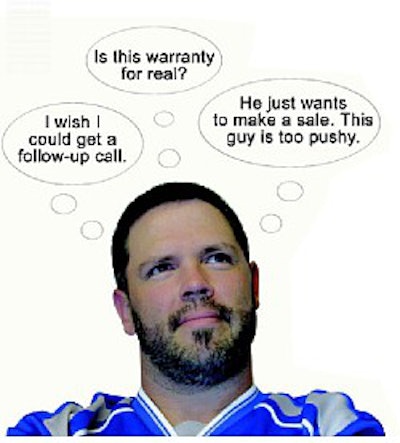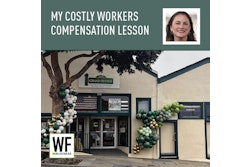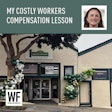

Have you ever done a great job of solving your prospect's problems only to find that he eventually bought from someone else? In frustration, you found that you really wasted a lot of valuable time. Have you ever had a prospect who told you exactly what he needed and then changed his mind?
Remember the old adage, "Find a need and fill it"? Even if you do a great job of questioning and presenting, you still may not be able to close 100 percent of the time. Basically, this is because even though you determined your prospect's needs (and got agreement), he still may have decided not to buy if you didn't discover his buying strategy. Forget, for the moment, your ability to overcome objections and your favorite five closing phrases. Your prospect is more likely to buy from you if you first know how he has made buying decisions in the past.
For example, Mike, an extremely successful salesperson in southern California, thought he had an airtight sale. His prospect, Tom, realized that as a self-employed professional, he needed Mike's product. Mike determined Tom's current monthly expenditures and how much he could save Tom and then suggested a product. He got agreement from Tom on the product benefits and was sure he would be able to close the deal.
Mike did an effective job of selling, right?
Wrong. Tom procrastinated for a week and then bought from Mike's competitor. Because Mike didn't determine Tom's psychological buying strategy—or how Tom had made his previous purchasing decisions—he lost a sale.
Do you always know how your prospect will decide to buy?
When you're booking an appointment during a telephone conversation, are you able to find out quickly what will get your prospect to give you an appointment? Or, when you see your prospect face-to-face, are you able to pinpoint what will make him choose your product over another?
Knowing this type of information about your prospect can make the difference between getting the sale and walking away empty-handed.
You must find out, before you call on your prospect, how that prospect will buy or what his decision-making strategy is, or you'll never reach a 100 percent closing rate. If you learn the right questions to ask, you can acquire this information quickly, and it will help you understand exactly what part of the product interests your prospect the most, precipitating his decision to purchase.
Supporting the Competition
Let's look at a few situations. If you sell flooring, does that contractor prospect already have a relationship with a distributor? Will you have to compete against somebody else he's currently using? One rule of thumb is to never criticize competitors. There is a good reason to follow this code of conduct. Not only is it unacceptable to downgrade other professionals, but also, chances are, if you do criticize your competition, your prospect will defend that vendor, whether or not he likes them.
Realizing this, you can discover a great deal about your prospect's relationship with the vendor by using phrases such as, "You use ABC Flooring Distributors? I've heard they are a good company. What do you like most about ABC Flooring?" Your prospect will reply, "The sales rep is truthful. He works very hard for me." Then you can say, "Sounds like you're very pleased with him." You're actually building that vendor up to the point that your prospect may, on the spot, tell you what he doesn't like about the vendor.
For example, I was in the midst of trying to secure a consulting contract with a large construction firm. When I telephoned my prospect from a referral lead, I asked some probing questions in an effort to find out his relationship with one of my competitors who already was working with the company. He said, "We're already using Dan Thompson for sales training." I said, "Tony, I've heard great things about Dan Thompson. What do you like about him?" Tony responded, "Well, he's got good delivery. My salespeople seem to like him. He's on target with what they do, day in and day out."
I then said, "Sounds like he's doing a super job for you." At that point, my prospect backed down a bit and started to be candid. I was, in effect, building my competition up too much in my prospect's eyes, so he found a few faults. The prospect said, "Dan is good, but I would like to see more variety in his approach. He does basically the same closing program over and over again, and I don't think my salespeople find his sales techniques challenging." Ahha—a chink in the armor! I found out what my prospect disliked about my competition without making any disparaging remarks.
Of course, when talking about competition, you can use such phrases as, "Are you getting the satisfaction you want from your present vendor?" This may work, but be careful; your prospect may see this as a criticism, and defend the competition.
Defining Perfection
Another great line is to ask your prospect what, in his opinion, is "perfection." This is extremely effective in making introductory phone calls and probing for information. You might say something like, "Let's assume you really had perfection when working with a flooring distributor. What does a perfect flooring distributor mean to you?" This is an effective and informative question. The prospect undoubtedly has a clear idea of what he wants in a vendor. Possibly your competitors do not know this.
The answer your prospect may give is, "My idea of the perfect flooring vendor is someone I can trust to consistently provide me with enough well-milled exotic flooring when I need it." This gives you a lot of information on what your prospect wants. He wants a specific kind of high-quality flooring, and he is concerned about always being able to find the quantities he needs.
Your next question might be, "Are you getting that, right now, from your vendor?" You see, you really can find out how people will buy if you ask them simple questions.
Be a Behavior Specialist
Do you believe people really can change if there is enough need and motivation and a deep desire to effect that change? If you answered, "No, people really don't substantially change," you're absolutely right. However, they can go through dramatic behavior modifications. Here's a common example. Have you ever tried to quit smoking? You may be saying, "Yes, of course, but I've never succeeded. I've tried to stop 17 times." Behavior modification will allow you to quit smoking, but it may take several attempts on your part before the result is permanent. In the context of all the behaviors that make up who you are, smoking is a very small one. There's a lot more to you than that. But, changing your smoking habit is extremely difficult to do.
If your prospect has ever purchased a product in the past that is even remotely similar to yours, he will use basically the same buying strategy in purchasing again. You can determine your prospect's strategic buying criteria by asking one or two questions. "How did you decide to buy the product before?" or "Why did you decide to buy that product before?" You probably will get answers like, "I bought it because the rep said that it is guaranteed to stand up to high traffic. He said he could show me 10 houses where the finish has stood up to high foot traffic without damage." Regardless of his needs, this simple analysis determines that the prospect probably will decide to buy your product because it meets his needs, is guaranteed to work and has been used successfully in other applications. Of course, you should fill his needs, but if you want to close that sale, you'll sell based on your knowledge of how he bought in the past.
To obtain more information about your prospect, another question you might ask is, "What would you like to improve?" The answer will provide you with further information on areas where he may be dissatisfied with his current vendor. This information will take you only minutes to obtain, but will literally put money in your pocket. Once you determine your prospect's buying strategy, you then use a concept called "instant replay." During the presentation stage of the interview, you "play back" or "replay" the same criteria your prospect just gave you in making buying decisions. You might say, "Mr. Prospect, I think you'll find that this product will offer you the durability we talked about, and it will save you money by cutting down on callbacks."
If you learn your prospect's buying strategy and play it back to him, you're going to close more business. To decide against buying from you, he would have to deny himself.
The Happy Ending
After Mike had determined another prospect's needs on a life policy, he then asked, "Have you ever bought a policy before?" His prospect said, "Yes, I bought a term insurance policy a few years ago that has a face value of $500,000." Mike said, "Why did you buy it?" The prospect said, "I was in a bad car accident a few years ago, and my wife got extremely upset. She immediately called an agent for life insurance. But, I wanted to earn better interest rates on my money, so I bought low-cost term and put the money I saved in premiums into a limited partnership." Mike asked, "Is there anything you'd like to improve on the policy?" The prospect replied, "Yes, but the agent has never once called to find out if everything was okay. I haven't seen or heard from him in three years."
Guess what Mike did? He jotted down these answers in his notes and then did an "instant replay" during the presentation stage. Mike simply said, "This universal life policy gives you the same benefits as your term insurance, and, in addition, gives you very high aftertax interest revenue. I promise you, I'll review your financial position yearly to make sure you have the right coverage for your income level." Do you think Mike got the business? You bet!
Future Planning
Have your ever had a prospect who has never bought a product like yours? You need to help this prospect project into the future. Use a phrase such as, "Mrs. Jones, you seem interested in purchasing prefinished flooring. I want you to imagine, for a moment, that you've had our flooring in your home for a year. During that year, how did you know that it was the best flooring for you?"
Listen carefully to her response. Suppose it goes something like this: "The finish is durable and stands up to the dog and the kids … The flooring adds to the value of my home … The company that I purchased the flooring from is solid and reliable." Guess how she will decide to buy flooring?
If you're sharp, you'll give her assurances based on her answer to your question.
"As If"
Another psychological concept in probing or interviewing is called the "as if" technique. Do you find it easier to sell to prospects who already know what they want? Do you ever interview prospects who don't already know what they want? The "as if" technique might help, but, be careful—the technique may work so well you could become spoiled and lazy.
You probably already know what your prospect wants, but he hasn't yet experienced it. Help him to experience your product before he buys it. Ask him this: "Mr. Prospect, let's assume it is two years in the future. What happened during that period that let you know this was a good buy for you?" He might say, "Well, I was able to get the flooring I needed right away, and you checked in after delivery to make sure everything looked good." Guess how you'll sell this prospect? You will have to prove to him that you have the stock to meet his needs, and you'll need to follow up after every order, proving you won't leave him feeling like an orphan customer.
Another way you can work the "as if" technique is to ask him how you should sell to him. You can do this simply by going into the near future and becoming a Monday-morning quarterback. For example, in selling a prospect a limited partnership recently, a broker in California said, "Let's assume our talk is over. What happened that let you know this was a good investment for you?" His prospect said, "Well, I guess you were able to prove to me that the general partner knew what he was doing. You showed me that he could fulfill his promises. Also, the market was shown to be good for this kind of investment." The broker then simply incorporated these "concerns" into his presentations.
By using the "as if" technique, you are bypassing the objection phase of the sale. By getting your prospect's strategies and concerns in advance, you are merely presenting useful and effective information in the way your prospect wants to hear it. Teach these techniques to at least two of your salespeople in the next week. You will discover your own way to apply these ideas and will remember them longer.
One Hundred Percent
If a 100 percent closing rate is your goal, use these techniques. Your prospect's decision strategy is not as enigmatic as it seems. In fact, when you use these techniques, your prospect will create the sale and close the deal for you. You'll end up with a satisfied customer and your highest production ever!
































